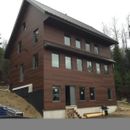Asking for advice from off-gridders about the recent blog “Solar thermal is really really dead”.
A recent blog by Martin Holliday has me rethinking our approach to our Super insulated off grid retirement home. I’m not going to rehash the blog but I’m wondering how people who specifically live off grid view the opinions in it. I’ve spent enough time living in off-grid situations to know that the math about our mechanical systems is different when there is no energy “bank” to go back to when you’re short.
Our project is a super insulated off-grid three story house (walk out basement) 2200sf, south facing with windows calculated for passive heating, two stories of concrete floors. We’re shooting for R60 walls and R100 roof. It’s located north of Montreal, so its completely unrealistic not to have a backup heat. The original plan was to have two Solar thermal panels that would heat two water tank “batteries”. Those tanks would preheat water for a propane instant water heater for the radiant floor, with a twin unit for DHW. The whole idea was keep the house just warm enough to keep from freezing when unoccupied, about 12C, and to heat with wood when we were there. The house would be unoccupied about half the year. As with everything about this project its DIY, I’m my own contractor.
That was then, the shell is now up, sealed and finished, with the inside completely bare, only three weeks behind schedule, my fault, I was late in ordering the windows. The blog by Martin has me rethinking the wisdom of my solar thermal approach. I always understood that a radiant floor wouldn’t be warm in this application but I figured if I was going put in the floors, I might as well throw some pex down and take advantage. I must admit I also liked the idea of no ducting. Has anyone had experience with radiant floors off-grid? On the flip side I’m much more comfortable with installing PV (a kissing cousin to my day job) and I like the idea of simply expanding a system that I’m already going to install. I just find it hard to believe that I can get the same BTU per square foot with PV as from solar thermal. This is a concern because the south facing wall real-estate is at a premium. I’d love to hear some input from the practical experiences of the members here.
I’ve include a photo of the house below. The space between the two bottom floors is ear marked for PV panels which will provide shading in the summer.
GBA Detail Library
A collection of one thousand construction details organized by climate and house part










Replies
Geoff,
As I wrote in my original article on the topic ("Solar Thermal is Dead"), "Solar thermal systems still make sense for off-grid homes." My opinion on that point hasn't changed.
Your planned solar thermal system (two solar thermal collectors connected to a tank, with a tankless propane water heater for backup) is similar to the system at my own off-grid house.
However, I disagree with your plan to install a heating system which requires an electric pump. The heating system for an off-grid house shouldn't require any electricity, because a heating system is needed during the months when sunlight is rare.
The two most common ways to heat an off-grid house are (a) a wood stove, and (b) a propane-fired space heater with through-the-wall venting. It's OK to have both.
If you buy a propane-fired space heater, make sure to buy a model that doesn't require any electricity. Empire brand heaters are widely available.
If you install an expensive hydronic system, you will abandon the system after one or two winters, once you realize how quickly the pumps drain your battery.
Geoff, I will soon be submitting an article on this issue. My ste up is similar to yours except 5 times the size, year round with 15 people in residence. 10,000 sq ft, I am north of your latitude and probably similarly bad solar winters. I am off grid 14 years. So. Here is my thinking. Martin is right, forget the in floor radiant...we have it and have not used it for several years! Pumps etc. we use pure firewood. With a super insulated house you don't need to feed them 12 hours a night and the amount in the is three or four times. We have 8 tiny houses each with electricity free propane heaters direct vent through the wall...when you are away they will give you good reliable decades long service, extremely eco mail upfront though propane is fairly expensive ( equivalent to electricity at 13 cents kwh at 70% efficiency. Next. Hot water. Her I have gone with substantial overkill pv. The price change in the last few years has just changed everything. No plumbing, 30 year lifespans, easy install, electricity can be use for anything... solar thermal cannot. Over production 8 months of the year should be aimed at and then you worry about abundance rather than lack. Cut your generator run time aim for 40 hours a year rather than 300 hours. Your batteries will love you for the number of 100% charges that big time pv will give you. Generators puttering away for hours straining against the battery resistance of the last 15% is just so wasteful. So in short: no in floor radiant, back up propane, overkill pv just because of its versatility rather than thermal hot water....and stay tuned for an article on my own experiences with all this stuff on a grand scale, should be ready in a few days if Martin is still up for it. Best wishes,Vensonata
I suggest looking at responses and advice from Daniel Young , Vaugh W , and Tom Lane . Possibly # 73 comment by Tom . Any electric used can be very minimal at this day in age also .